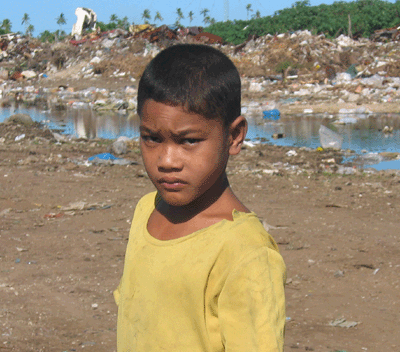







| PROGRAMMES | PROE | PUBLICATIONS, LIBRARY and IRC | SITE MAP | SPREP FORUMS | WEBMAIL - Global / Local | CONTACT | HOME
| Search |
International Waters Project
Year of Action Against Waste – Special Report : How much is poor waste management costing the Pacific?
3/2/2005

We often hear that waste – solid, human, and animal – is threatening our water supplies, our health and even our fisheries. But have you thought how much it also costs ordinary citizens their hard earned cash? When polluted water makes our families sick, we have to pay for their medicine and doctors visits. And, if we ourselves get sick and can’t come to work, our bosses foot the bill by paying us wages for the days that we don’t work. Do we know how much do these losses add up to?
The International Waters Project is about to begin one of the regions’ first studies into how much money Pacific island citizens could be losing as a result of poor waste management. This economic valuation study is intended to help the Tongan Government understand the economic losses that could be avoided through improved waste management. The study is to be led by Dr Padma Lal of the Forum Secretariat with the assistance of local research assistant, Ms. Lilieta Takau.
According to Sione Fakaosi, National Coordinator for the IWP, the economic valuation is intended to help the government and the Tongan people understand the economic losses due to waste – losses that might be minimised and, in some cases even avoided, through better waste management.
“The valuation should reveal who suffers as a result of waste problems, why and how much it costs them. It will attempt to reveal the cost that waste imposes on households as well as the government. Once we know this, we can get a better feel for how much money ordinary people and the government could save by better managing waste,” he says.
“If we know how much money we’re losing because of waste problems, we’ll have a better idea about how much money we could actually save by getting involved in waste management activities. The same information can be used by the government when making decisions about how much to invest in waste management compared to other social issues,” he says.
Dr Padma Lal says the Forum Secretariat is interested in helping countries to objectively analyse their resource and environmental problems in order to identify more effective management strategies that governments and local communities can implement. The Forum Secretariat is also keen to see that countries can develop local technical skills through these activities. Dr Lal will therefore be training Ms. Takau in valuation techniques. “This way, Tonga will develop some local expertise to advise the government on waste values in the future,” said Dr Lal. “There are few people in the Pacific region who know how to conduct such valuations studies so training up Lili will provide Tonga with lasting benefits for the future.”
Together, Dr Lal and Ms. Takau will meet with local experts and stakeholders in the coming weeks to consider the impact of waste on Tongatapu and assess the costs of such impacts. Ms. Takau will also accompany Dr Lal back to Fiji, later in the project to continue the work. Initial results from the study should be available around June this year with final results available around August 2005.
For further information on this activity, please contact Sione Fakaosi, National Coordinator IWP Tonga.
Contact Name |
Steve Menzies |
e-mail |
stevem@sprep.org |
Phone |
(685) 21929 |
Fax |
(685) 20231 |
.
